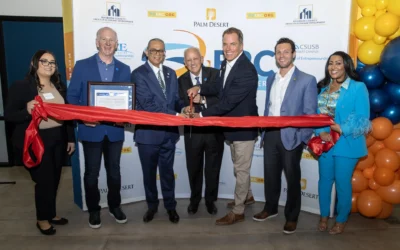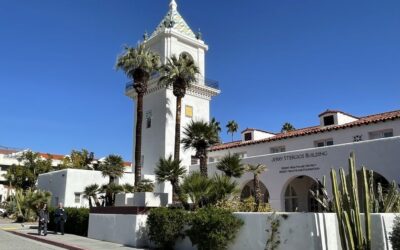The California Transportation Commission (CTC) has awarded $50 million for Addressing Climate Change, Emergencies, and Sandstorms (ACCESS) Project on Indian Canyon. The ACCESS project, spearheaded by the Coachella Valley Association of Governments, aims to solve the frequent road closures that have plagued the City for decades.
The funding was unanimously approved as part of the CTC’s inaugural cycle of the Local Transportation Climate Adaptation Program (LTCAP). Indian Canyon was one of only two projects statewide that received the CTC’s highest priority ranking. The project was also highlighted during the CTC’s meeting in the City of Riverside.
“This is a monumental moment. These prolonged and frequent closures of Indian Canyon Drive are not just a minor headache for one city; they put roads across the western Coachella Valley at a standstill and have devastating impacts on our ability to get people to Desert Regional Medical Center at a time when every second counts,” said Desert Hot Springs Mayor Scott Matas, Chair of CVAG. “Our entire region worked collaboratively to prioritize improvements along Indian Canyon and we’re grateful the California Transportation Commission continues to financially support our efforts. I know I join residents across the Coachella Valley in saying ‘finally!’”
The news comes on the heels of actions taken at a joint meeting of CVAG’s Executive and Transportation Committees on December 4, which authorized the CVAG Executive Director to take the necessary steps to accept the funds. CVAG’s Executive and Transportation Committees also unanimously approved amendments to the existing engineering and design contract to keep the project on schedule.
“This much-needed funding for an elevated bridge at North Indian Canyon is absolutely outstanding news,” said Palm Springs Councilmember Lisa Middleton, who serves on CVAG’s Transportation Committee and has long worked to deliver this project to the west end of the Coachella Valley. “Following the destructive impacts of the 2019 Valentine’s Day flood in Palm Springs, it became clear that a bridge at North Indian Canyon was desperately needed and we tripled our efforts, which has led to this terrific outcome. We are extremely grateful to the California Transportation Commission, CVAG, and all of the Coachella Valley cities for partnering with Palm Springs to help move this project forward. We understand the importance of Indian Canyon to thousands of Coachella Valley residents – and your relief is finally at hand.”
The ACCESS – Indian Canyon grant application stemmed from the solutions that were first identified in the Flood and Blowsand Risk Assessment and Improvement Plan for the Western Coachella Valley. The flooding and blowsand study analyzed projects across the cities of Desert Hot Springs, Palm Springs and Cathedral City. Indian Canyon Drive was quickly prioritized by CVAG’s Executive and Transportation Committees as it serves as a critical arterial route for both Palm Springs and Desert Hot Springs.
“Not only is this roadway a critical artery for commuters, but it’s also the main artery to the Coachella Valley’s only level one Trauma Center at Desert Regional Medical Center,” said Palm Springs Mayor Grace Garner. “This is about saving lives; especially when there is an emergency that shuts the road down for a prolonged period like we recently experienced with Tropical Storm Hilary. On behalf of our residents, we are deeply thankful to the California Transportation Commission for recognizing that this is a life and death issue – and for stepping up to help fund this much-needed new bridge, which will improve the quality of life for everyone who depends on North Indian Canyon to get to their destination.”
In shaping the grant application, CVAG wanted to ensure that no other project better aligned with the CTC’s vision for the LTCAP funding. The ACCESS – Indian Canyon project includes improvements that protect at-risk transportation infrastructure, increase the community’s climate resiliency, enhance mobility, preserve the environment, and improve public health and safety for residents and visitors.
The CTC received 22 project nominations totaling over $388 million in funding requests. An evaluation team consisting of CTC and Caltrans staff reviewed project nominations based on the criteria identified in the Commission’s adopted guidelines. The award from the CTC was recommended by CTC staff in November.
“I am thrilled that CTC approved $50 million of funding for CVAG’s ACCESS project, a crucial initiative to address flooding and blowsand road closures on Indian Canyon Drive,” said Assemblymember Greg Wallis. “As one of only two projects throughout the state that received the maximum grant award, this investment ensures that the Coachella Valley obtains its fair share of resources to build safer, healthier, and more resilient communities in the 47th Assembly District. Together, we can build a transportation system that withstands climate challenges and secures our community’s well-being, positively impacting lives and sustaining our local economy.”
Added Assemblymember Eduardo Garcia: “We are grateful to see unprecedented state investments continue to support our community’s urgent infrastructure needs. This $50 million grant will vastly improve public safety, safeguards during storms, and roadway connectivity. We applaud CVAG and the City of Palm Springs for their leadership and commitment to work collaboratively as one, united Coachella Valley region.”
Several agencies, organizations and individuals have also voiced their support for CVAG’s funding applications: the cities and towns of Cathedral City, Coachella, Desert Hot Springs, Indio, La Quinta, Palm Desert, Palm Springs, Rancho Mirage, Twenty-Nine Palms and Yucca Valley; Agua Caliente Band of Cahuilla Indians; County of Riverside and Supervisor V. Manuel Perez; Riverside County Transportation Commission (RCTC); Palm Springs Police and Fire Departments; Palm Springs Unified School District; College of the Desert; Coachella Valley Economic Partnership; Coachella Valley Housing Coalition; Desert Care Network, including Desert Regional Medical Center and Hi-Desert Medical Center; Desert Healthcare District/ Foundation; Desert AIDS Project; American Medical Response; Coachella Valley Conservation Commission; Desert Community Energy; and UC Riverside’s Dr. Lynn Sweet.
“Today’s vote is welcome news as we work together as a region to keep our critical arterials open,” said Coachella Mayor Steve Hernandez, Chair of the CVAG Transportation Committee. “Whether it is Indian Canyon or projects like Monroe Street and Avenue 50 in the eastern Coachella Valley, we need investments like these to ensure a safe and reliable way for our communities to get to work, school, and home.”
The project’s design and engineering are underway. Additional project details are here: https://cvag.org/library/pdf_files/trans/ACCESS_Fact_Sheet.pdf




